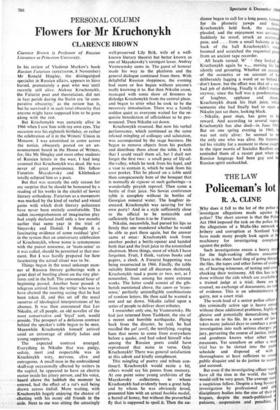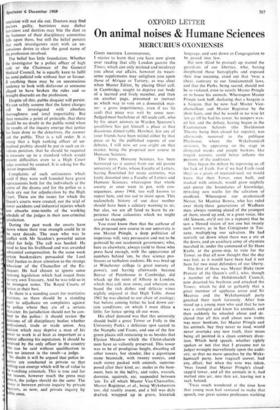THE LAW
Policeman's lot
R. A. CLINE
Why does it fall to the lot of the police
• investigate allegations made against police? The short answer is that the Poli Act 1964 imposed the task on the police. B the allegations of a Mafia-like network bribery and corruption at Scotland Ya have made many people look again at machinery for investigating complain against the police.
Such investigations create a heavy stra for the high-ranking officers concern There is the sheer hard slog of going throug the files, the tapes and other forms of evide ce, of hearing witnesses, of testing and cro checking their testimony. All this has to done without the aids which are available a trained judge at a trial; there are counsel, no exchange of documents, no ru of evidence. This is an administrative I quiry, not a court trial. The work-load of a senior police officer this criminally active age is heavy enou without these additional problems, highly _plosive and potentially demoralising, bet thrown on to his file. In a court of law takes many judicial days to conduct a prop• investigation into such serious charges: jury, perverting the course of justice, bri and goodness knows what other MI meanours. Yet somehow or other a ma trial has to be slotted into the pack schedule and disposed of with thoroughness at least sufficient to ass , public disquiet and to do justice to acc and accused.
But even if the investigating officer were have all the time in the world, the bury• would still be very great. The average man a suspicious fellow. Despite a long history' investigation by professional and 0 'disciplinary bodies into the sins of their leagues, despite the much-publicised pulsions, suspensions and penalties, suspicion will not die out. Doctors may find doctors guilty, banisters may disbar barristers and dentists may bite the dust as the hammer of their disciplinary committee falls upon them, but still the belief persists that such investigators start with an un- conscious desire to clear the good name of
the profession involved. • The belief has little foundation. Whether the investigator be a police officer of high rank or the Chairman of the General Medical Council, he is equally keen to fulfil his semi-judicial role without fear or favour. if anything there may be an unconscious tendency to look with disfavour at someone alleged to have broken the rules and so brought discredit on the profession. ` Despite all this, public disquiet will persist. We can safely assume that the latest charges will be investigated with absolute thoroughness and total impartiality. But there remains a point of principle, that there should be no doubt in the public mind when the results of the inquiry emerge that justice has been done to the detectives, the accuser and the public. That is a tall order. It is wrong that a high ranking officer of un- doubted probity should be put in such an in- sidious poSition, that he should be required to measure up to a standard which would present difficulties even to a High Court judge assisted by counsel. It is asking for the almost impossible.
Complaints of such seriousness which could if they were well founded have grave repercussions both for the individuals at the centre of the drama and for the police as a whole cry out for adjudication by the High Court. These are the issues for which the Queen's courts were created, not the trial of motor accidents and industrial injuries which now absorbs nine-tenths of the working schedule of the judges in their non-criminal jurisdiction.
During the past week the courts have shown where their true strength could lie in the next decade. The man who was In conflict with Mr Scanlon's powerful union called for help. The call was heeded. He stood to lose his livelihood and was awarded substantial compensation. In the same week certain bookmakers persuaded the Lord Chief Justice to draw attention to the strange behaviour of the Chancellor of the Ex- chequer. He had chosen to ignore some licensing legislation which had issued from his very own Treasury. And he was told so in the strongest terms. The Royal Courts of ustice at their best.
As there is a•standing court for restrictive practices, so there should be a standing Lin to adjudicate on complaints against e police where they are of a serious haracter. Its jurisdiction should not be con- ned to the police: it should review fite isions of all disciplinary bodies whether ofessional, trade or trade union. Any ision which may deprive a man of his suer to work is at least as important as a nder affecting his reputation. It should be viewed by the only officer in the country ho can be said without qualification to ve no interest in the result—a judge.
No doubt it will be argued that police in- uiries are conducted. in private so that othing can emerge which will be of value to watching criminals. This is true and for t reason, however much the press may Nest, the judges should do the same. The eice is between private inquiry by private firers, as now, and private inquiry by blic ones.







































 Previous page
Previous page